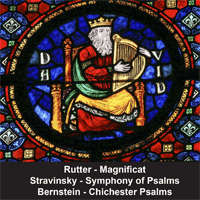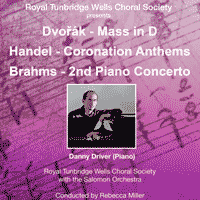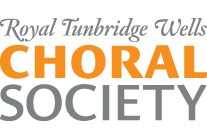114th Season: Programmes and Reviews 2017-2018
 Spring concert
Spring concert
29 April 2018 in the Assembly Hall
Rutter – Magnificat
Stravinsky – Symphony of psalms
Bernstein – Chichester psalms
Click on image to view programme,
Critique of the Royal Tunbridge Wells Choral Society concert on Sunday 29th April 2018
How fitting that conductor Rebecca Miller’s last concert with the Royal Tunbridge Wells Choral Society contained such an eclectic mixture of twentieth century styles, revealing the choir’s ability to produce a varied programme so professionally.
Accompanied with full support once again by the redoubtable Salomon Orchestra (led by Tara Persaud), the choral society commenced John Rutter’s Magnificat with clear, lucid tones from the soprano section. Some beautiful phrasing ensued, with well-balanced four-part harmony. Certainly, there was evidence of much joy, including themes of dancing and syncopated rhythms which were managed with apparent ease. The choir handled the contrasting sections of liturgical text, English poetry and prayers with sensitivity, ranging from monophonic vocal lines to luscious harmonies.
Eleanor Partridge’s clear soprano voice floated effortlessly over both choir and orchestra in “Et Misericordia”, while the gentle pastoral rhythm of “Esurientes” introduced by the soloist and quickly taken up by the chorus brought a calm, translucent quality to the work, with perfect tonality.
The final “Gloria” was performed exuberantly, with the soprano’s beautifully haunting solo accompanied by harp and flute to remind us that this whole work is devoted to the Virgin Mary.
Rebecca Miller was, as ever, in total control and the tricky rhythms were employed most effectively.
Stravinsky’s Symphony of Psalms, written in 1930, contains evidence of neo-classicism with the key often undermined and unusual instrumentation (no violins, violas or clarinets). In the first movement “Prayer of the sinner for divine pity”, the choir rose to the challenge of singing minor seconds and slow chords, while “Recognition of Grace Received” contained wide intervals and discords which were employed effectively. The final “Hymn of praise and glory” revealed the orchestra’s contrasting rhythms accompanying repeated choral thirds, use of canon and a lovely hypnotic blend of harmonies before coming to rest on the chord of C major. This was a challenging work which was performed with careful consideration to detail from both choir and orchestra.
Leonard Bernstein’s Chichester Psalms, set in Hebrew, commenced with an assertive rendition of psalm 108 and the choir made good use of the asymmetrical time signature. The gentle psalm 23 was sung with excellent use of legato by countertenor Sean Yap with the chorus softly complementing his solo. Another unusual time signature pervaded the final peaceful movement which flowed along easily with an even vocal tone, culminating in a superbly tranquil conclusion.
Rebecca Miller conducted choir and orchestra with her usual dynamic enthusiasm and outstanding musicianship. Her presence will be sorely missed, but she may rest assured that her successor will be taking on a choir with a thorough understanding of choral music. Her speech implored us all to encourage the next generation to continue this tradition, and it was delightful to see several young faces in the choir today.
Special mention must go to Jamie Sperling, associate conductor and to Craig Hudson, rehearsal accompanist, who have given so much support to the choir.
Congratulations to all concerned – this was a concert ranging from energetic rhythms to moments of deep tranquillity and – perhaps most important of all – sincere commitment to the text. Well done!
Michele Roszak
 Autumn (Remembrance Sunday) concert
Autumn (Remembrance Sunday) concert
November 12th 2017 in the Assembly Hall
Handel – Coronation Anthems nos 1 and 2
Brahms – Piano Concerto no 2 with Danny Driver (piano)
Dvořák – Mass in D
Click on image to view programme,
Critique of the Royal Tunbridge Wells Choral Society Concert on Sunday 12th November 2017
Once again, a large audience attended the Royal Tunbridge Wells Choral Society’s Remembrance Day concert at the Assembly Hall this afternoon, with conductor Rebecca Miller and the London based Salomon Orchestra led by Tara Persaud.
The programme commenced with Handel’s Coronation Anthem no.2 “Let Thy Hand be Strengthened”. The clarity of part writing, with flowing melisma and attention not only to musical detail but also to vocal articulation and diction was evident from the start. This is an anthem of jubilation, written to be performed at Westminster Abbey for the coronation of George II, and throughout its relatively short duration the choir and orchestra delivered an excellent rendition.
Brahms’ Piano Concerto no.2 was performed with much sensitivity, the piano and orchestra displaying the great degree of Romanticism which pervades the whole work. Guest soloist Danny Driver explored the piano’s depths of sonorities, dynamics and range which he employed with outstanding pianistic technique and dexterity. The grand dramatic scale of this work was expertly expressed. Dynamic contrasts were beautifully controlled, with devastatingly effective pianissimo in the Andante movement. Rebecca Miller made much use of the delicate rubato and teased out every nuance that was on offer. This was indeed a work of passion which led the audience to all the extremes of human emotion.
Handel’s Coronation Anthem no 1, the better known “Zadok the Priest” set the tone for the second half of the concert, with powerful use of voices and orchestra, and clear vocal runs from the choir.
The afternoon culminated in Dvorak’s Mass in D, first performed in England in 1893 at the Crystal Palace. Clear, lucid part singing with good intonation and musical phrasing all combined in the contrasting six movements of this delightful Czech Latin Mass. The choir explored the luscious intricate harmonic rhythms to excellent effect. This is a demanding work which requires a wide vocal range and ability to pitch complicated intervals, and the singers rose to the occasion with confidence, ably accompanied by an empathic orchestra. Subtle use of gradation of dynamics and tone helped to create the appropriate atmosphere of remembrance.
Rebecca Miller is, as always, a wonderful conductor, extracting every subtlety and nuance from both choir and orchestra. In total control throughout, she managed to allow the music to express itself from moments of extreme passion through to those of quiet reflection. In her own words, “putting on a concert like this looks so easy”, and that of course is the art of the true professional. The RTWCS has worked very hard to produce another high calibre, thoroughly enjoyable performance, ably supported by their associate conductor Jamie Sperling and rehearsal accompanist Craig Hudson. Many congratulations to all involved.
Michele Roszak
